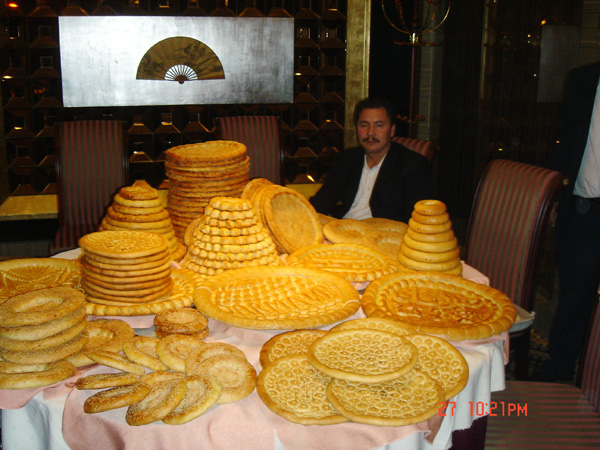Naan bread baker hoping to make plenty of dough in Xinjiang
By Gao Bo (China Daily) Updated: 2014-04-22 08:09 |
|
Abulajan Mettohot, the owner of Xinjiang Abulajan Naan Chain Co, sits in front of a load of naan bread. [Photo/China Daily] |
"This is the first year of my plan to expand the company. It's important to me and to all my employees," said Abulajan Mettohot, the owner of Xinjiang Abulajan Naan Chain Co, who has set up a training program in his hometown in Yecheng county and in other two counties, Shule and Yengisar in Kashgar prefecture.
As many as 500 youngsters in each of the venues will be taught to make naan, and the program will eventually be extended to Shache and Zepu counties.
Naan outlets can be seen everywhere in Xinjiang, and the tandoor - the specially constructed pit in which the bread is baked - can double as a shop.
"Baking naan is hard work. You have to get up early and stand at the tandoor for hours because the customers like hot naan. I want more people to learn how to cook naan and appreciate it," said the baker-turned-entrepreneur.
When they complete the short course, the trainees will be awarded a certificate and, possibly, the opportunity to work at one of the outlets Abulajan plans to open in 2,100 high schools and colleges across China in the coming years.
The program is jointly sponsored by the Committee of the Xinjiang Communist Youth League and Abulajan's company. "Once the youths have jobs, they'll be less inclined to get up to any tricks or behave poorly, so the training plan is good for society," Abulajan said.
Traditional tandoors burn a mixture of charcoal and coal, but in 2010, in an attempt to reduce air pollution, Abulajan invented and patented an electric tandoor, which is now used in six of his chain's outlets. To encourage more bakers to use the electric tandoor, the local government provides a subsidy of 6,000 yuan ($963) for each oven bought, covering 75 percent of the purchase price.
"It's a combination of traditional industry and technology. Also, because it's mobile, the operator doesn't have to worry too much about rental costs," Abulajan said.
Soon, the residents of downtown Urumqi will be able to buy bread from an environmentally friendly mobile kitchen - an e-car fitted with two electric tandoors - and Abulajan is working to develop a patented electric pit for baking a special type of large naan that originates in Kuqa county, Aksu prefecture.
However, production, storage, packaging and transportation have been key challenges for Abulajan. In 2011, a production line, covering 30 mu of land (2 hectares) that makes 3 million to 4 million naan a month, was put into operation in Shule. "Experts from Xinjiang Agricultural University helped us design packaging that prolongs the shelf life of our products to six months," Abulajan said. The innovation will allow him to sell his bread the length and breadth of China, and even overseas.
"Naan is not only a type of food, but also a cultural tie between people," he said. "If I bake delicious naan, people will surely treat me as a friend."
- More female officials caught in corruption
- Whampoa veterans recorded with glory
- Police bust 9 terrorist groups in Xinjiang
- Knife-wielding attackers seized in Xinjiang
- New regulation leads to drop in petitioned cases
- Hunan plant shut as probe into lead poisoning begins
- Police boost efforts to combat gambling
- Project offers jobs openings to legal experts
- Experts: Dog meat festival 'illegal'
- Nation looks to upgrade
pipeline networks






